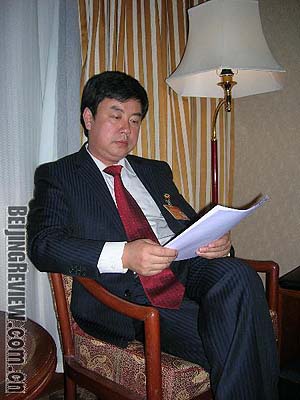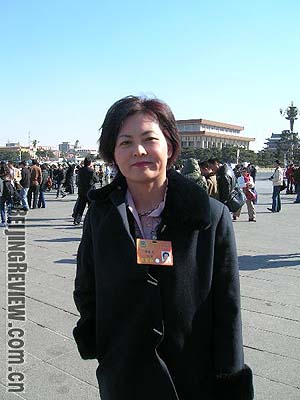|

DEEP CONCENTRATION: Chen De, a government official from a small city in China's northeast and member of the CPPCC National Committee, does a final check on his proposals before handing them over
When 43-year-old Chen De was made a member of the National Committee of the Chinese People's Political Consultative Conference (CPPCC) in January, he was congratulated by many people.
The government official administrating industry and commerce in a city on the border with North Korea, in northeastern Liaoning Province, was the first person from his home city appointed to the committee in its 59-year history.
Chen's wife was the only person feeling unhappy. To her, the new post meant her husband would have to spend a part of his squeezed spare time, between his full-time job and a three-decade hobby of collecting items on Mao Zedong, investigating social issues and writing proposals to the CPPCC. This would further postpone Chen's teenage daughter's request to go camping with papa and mama one weekend, "just like everyone else."
Chen, who has come to Beijing for the first annual session of the 11th CPPCC National Committee opening on March 3, feels his brand new five-year term means both a great honor and heavy responsibilities. He told Beijing Review, "I am willing to study and work harder to write high-quality proposals on public issues with reasonable solutions."
Participating in a two-day training course before the opening of the annual session, the new members of CPPCC National Committee learned how to be competent CPPCC National Committee members by listening to lectures on CPPCC history, functions, international and domestic situations, as well as talks given by old CPPCC National Committee members on their own experiences and how to write a high-quality proposal.
The CPPCC is a patriotic united front organization of the Chinese people, serving as a key mechanism for multi-party cooperation and political consultation under the leadership of the Communist Party of China (CPC), and a major manifestation of socialist democracy.
At present, the CPPCC consists of representatives of the CPC and non-Communist parties, personages without party affiliation, and representatives of people's organizations, ethnic minorities and various social strata.
Of the 2,237 members of the 11th CPPCC National Committee, more than 60 percent are non-communist and over 55 percent are new members. The over 1,000 new members brought suggestions and proposals as varied as they are delicately prepared to the first annual session. Some proposals focus on top-ranking issues concerning the majority of the population, such as rising inflation and housing prices, limited coverage of social security, insufficient government input in medical care, others put forward issues of strategic significance for China's development and still others originate from proposal authors' own work experience, often exposing what went wrong in the implementation of a government policy.
The new members of the top advisory body are almost exceptionally confident that their suggestions and proposals will be carefully evaluated and responded to. Different from motions submitted to a session of the National People's Congress (NPC), the country's top legislature, that become legally binding when they are adopted, proposals to the CPPCC are not legally binding and a department in charge of handling proposals is obliged to give a reply to each proposal.
During the five-year tenure of the just concluded 10th CPPCC National Committee, over 23,000 proposals were handled.
National policies as large as the strategy of rejuvenating the old industrial bases of the northeast and promoting the development of the non-public sector and as small as adding traditional festivals to national holidays all originated from proposals by CPPCC members.
Voices from the grassroots
In a one-hour talk with Beijing Review, Chen emphasized several times that his advantage at the CPPCC session was being able to speak for the underprivileged, as his research and investigation as a CPPCC member has allowed him to see the effects of unaffordable medical care and tuition bills on disadvantaged people with his own eyes.
In an online survey conducted by the website of Xinhua News Agency on social issues that deserve the most attention at the annual sessions of the NPC and the CPPCC, top-ranking topics were inflation voted for by 11.5 percent of respondents, high house prices by 9.4 percent, medical care by 9 percent and punishment of corrupt officials by 8.9 percent.
It is not surprising that Chen put forward three proposals on improving medical care, employment promotion schemes and social security.
Before writing his proposal on medical care, Chen traveled to the rural areas in his home county, to find that hospitals in the townships, the economic centers of a population of dozens of thousands of people, were often too shabby and understaffed to function even as a clinic. The poor condition of these hospitals, due to lack of money, made them unqualified to be the designated hospitals for new rural co-operative medical care so that in the case of one township Chen visited, farmers had to travel over 100 km to go to a designated hospital, whose receipts can be partly compensated for by the government-sponsored medical care system.
"The new rural cooperative medical care is really a good thing that can ease farmers' financial burdens for medical care. The problem is that the expense for farmers of long journeys to the hospital can be larger than the medical expenses compensated for by the government," Chen said. He suggested the government should enlarge financial support to rural medical institutions to upgrade their facilities.
Chen has observed the rising inflation in China from a different angle to many. From his daily work of monitoring his local market, Chen witnessed pork prices double in less than a year in 2007, while prices of other daily necessities remained stable. "My suggestion on curbing inflation is that the government should adjust the development of different industries on the macro level. The key is to give incentives to certain industries whose products had experienced the most dramatic hikes," Chen said.

CONFIDENT IN HER MISSION: Xu Xiaolan, a new member of the CPPCC National Committee and member of the China Zhi Gong Party, is confident her proposals will be solved by the government
Sun Fengyuan, a new member of the CPPCC National Committee, is an eye surgeon with more than 20 years of experience and vice-director of an ophthalmologic hospital in Tianjin.
He brought to the annual session of the CPPCC two proposals, both closely related to his work experience. He said hospitals in China, including his own hospital, have been caught in a craze of overvaluing an MD degree and undervaluing the practical kills of the candidates in recruiting medical college graduates.
Sun said a relatively large pool of medical college graduates in recent years have provided big hospitals more room in selecting doctors. Yet the excessive emphasis on academic studies in the labor market has caused the dilemma that many medicine doctorate holders fresh out of college have missed the best timing to be trained as a surgeon. "It is usually easier to train a young doctor in his or her early 20s as a good surgeon than a doctorate holder in his or her 30s with no experience in practicing medicine," Sun said.
Yet the apparent oversupply of medical college graduates does nothing to ease China's chronic social problem of difficult access to over-priced medical care for the general public. Sun explained medical resources have been distributed unevenly in China. While good staff and equipment concentrate mainly in renowned public hospitals in cities, community clinics and smaller hospitals in cities and rural areas suffer from acute shortages of medical equipment, government financing and competent doctors and surgeons. Some of Sun's students, with a master degree in medicine, would rather work for drug companies than work as doctors in small hospitals after they were refused by big hospitals.
"People can only trust doctors in big hospitals, which makes access to medication difficult while community clinics and smaller hospitals have to prescribe expensive medicines for patients to make money to survive, which partly explains people's complaints about expensive medical care," Sun said.
Sun wrote down suggestions to the government in his proposals: increasing the practical skill training of medical college students and enlarging government investment in community clinics.
Also a new member of the CPPCC National Committee, Xu Xiaolan is a member of China Zhi Gong Party and vice-director of the China Center for Information Industry Development. Two of her seven proposals expose problems from her daily work that she has been thinking about for a long time. One proposal is to boost information sharing between government websites. The concrete measures include building a unified government information platform in the long run and training chief information officers out of civil servants in the short run. The other proposal, full of the latest statistics and graphs, demands government subsidies for farmers to purchase personal computers and broadband Internet equipment, and to provide computer training.
"I am confident that the issues in my proposals will be solved. On the one hand, the state has given more attention to CPPCC member proposals. On the other hand, good quality proposals, with thorough analysis on reasons behind the problem and sound measures for solving the problem, will be put into practice even faster," Xu said.
| 